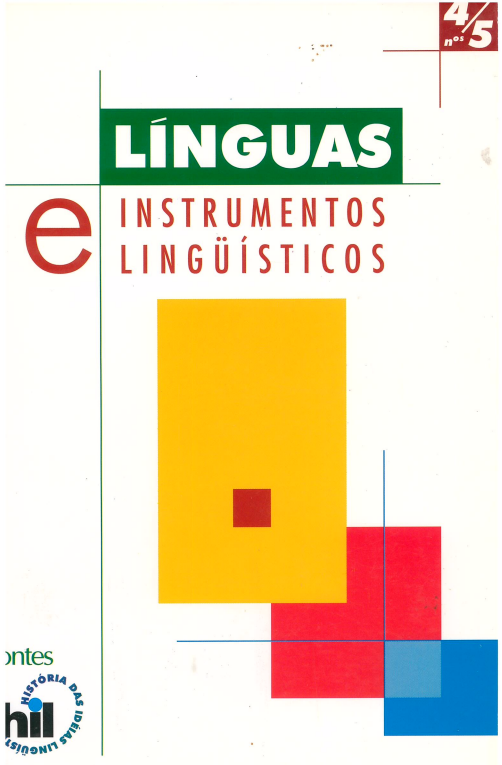Abstract
The history of linguistic thought is normally thought to consist of periods with more or less well-defined ruptures. What are the criteria that leal us to believe that a new begins, that we can identify a new school of thought. Is a new epoch defined by the progress of science itself, or rather by the author" claim to novelty. Following Sylvain Auroux, three components of the epistemic process, and hence for criteria to subdivide it into periods, are distinguished: pratical ( i.e.,political, historical and other conditions of research), social (i.e. interaction with the relevant group), and internal (i.e., ideas and the way in which these are classified). Based on findings from a larger research project, it is then discussed how these three sets of criteria might allow us to identify the French group of "Ideologues" as a novel school of linguistic thought.
References
AUROUX, Sylvain. (1987). Histoire des sciences et entropie des sistemes scientifiques. Les horizons de retrospection", in P. Schmitter: Zur Theorie und Methoden der Geschichtsschreibung der Linguistik, Tubingen, S. 20-42.
CODONER, Carmen e GONZALEZ IGLESIAS, Juan Antonio. (1994). Antonio de nebrija: Edad Media y Renacimiento, Ediciones Universidad de Salamanca.
DESTUTT DE TRACY, Antoine L. (1801-1815). Elements d'Ideologie, Paris.
ECKERT, Gabriele. (1990). " Franzosisch: Periodisierung", in: Gunterr Holtus/ Michael Metzelin/ Christian Schmitt (org): Lexikon der Romanischen Linguistik (LRL), Band V.I, Tubingen, S. 816-829.
LUDTKE, Jens. (1984). Sprache und Interpretation. semantik und Syntax reflexiver Strukturen in Franzosischen, Tubingen.
MANHEIM, Karl. (1929). Ideologie und Utopie, Frankfurt a.M.
MERCIER, Louis-Sebastien. (1801). Neologie, ou vocabulaire de mots nouveaux, Paris.
MONGIN, François. (1803). Philosophie elementaire, Nancy.
SCHLIEBEN-LANGE, Brigitte. (1985). " Wie Kann man eine Geschichte der (minderheiten-) Sprachen Schreiben. Uberlegungen zu 'Decadence' und 'Renaissance' de Okzitanischen und des Katalanischen", in: Hans Ulrich Gumbrecht/Ursula Link-Heer (org): Epochenschwellen und Epochenstrukturen im Diskurs der Literatur- und Sprachhistoire Frankfurt a.M., S. 324-340.
SCHLIEBEN-LANGE, Brigitte. (1989). "Uberlegungen zur Sprachwissenschaft um 1800. Methodologische und Historiographische Beitrage zum Umkreis der "ideologie", Bd. I, Munster, S. 11-23.
SCHLIEBEN-LANGE, Brigitte. (1990). " Mongin, Ideologue de la Meurthe", in: Hans-josef Niederche/Konrad Koerner (org.): History and Historiography of Linguistic, Bd. 2, Amsterdam, S. 541-557.
SCHLIEBEN-LANGE, Brigitte, DRAXLER, Hans-Dieter, KNAPSTEIN, Franz-josef, VOLCK-DUFFY, Elisabeth e ZOLLNA, Isabel (orgs.). (1989-1994). Europaische Sprachwissenschaft um 1800. Methodologische und historiographische Betrage zum Umkreis der "ideologie", 4 Bde., Munster.
SILVA, Rosa Virginia mattos. (1994). "Para uma caracterização do Periodo Arcaico do Português", in: D.E.L.T.A. - Revista de Documentação de Estudos em Linguistica Teorica e Aplicada, vol. 10,1994.
WUNDERLICH, Peter (org.) (1982). Du mot au texte, Tubingen.

This work is licensed under a Creative Commons Attribution-NonCommercial-ShareAlike 4.0 International License.
Copyright (c) 2000 Línguas e Instrumentos Línguísticos

